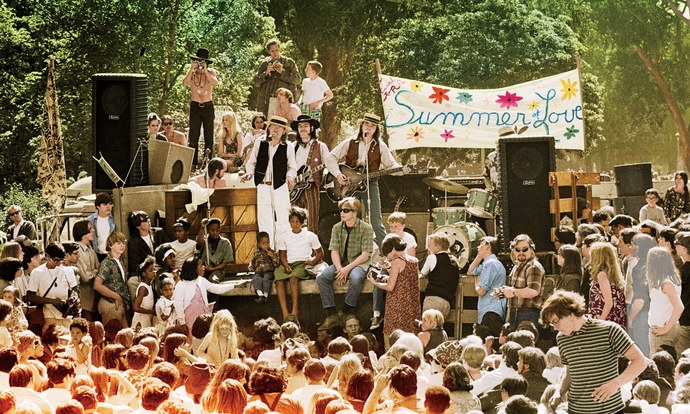In San Francisco, 1967, a cultural revolution was taking place. Teenagers were questioning and challenging the values of the previous generation; conservatism, monogamy and tradition were rejected in favour of vibrant music, sexual liberation and psychedelia. This year marks the 50th anniversary of the Summer of Love. In light of this historical milestone, it’s interesting to reflect on the reverberations of this phenomenon as well as the Summer of Love’s continuing relevance in modern music and culture.
1967 was marked with the release of iconic albums such as Jefferson Airplane’s Surrealistic Pillow; a record which can only be described as a kaleidoscopic journey through the crazed psychedelic world of LSD use and hippie aestheticism. The album was, and still is, representative of everything the Summer of Love was perceived to be. Even in their demise, there are parallels between Jefferson Airplane’s drug-fuelled downfall and the sudden and bitter end to the Summer of Love.
Last year, ‘White Rabbit’, arguably the most famous song from Surrealistic Pillow, was re-recorded by Pink! for Tim Burton’s film ‘Alice Through the Looking Glass’. The recreation of not only such a seminal hit, but of a story which has been endlessly associated with psychedelia demonstrates an underlying desire to reimagine the zeitgeist of the Summer of Love.
Undeniable similarities can also be drawn between the social and political atmosphere of 1967 and 2017. Whilst it must be noted that the violence of the 1967 Detroit riots is incomparable, it is clear that both years are full of aggression and uncertainty. While sixties America was faced with the opposition of those for and against the Vietnam war, this stark divide between the far right and liberalism seems to have re-emerged as a consequence of Trump’s presidency. This tension appeared to characterise a nation in its musical tastes and reflected an opposition to global events of the time.
Music popularised by the Summer of Love and hippies alike celebrated the anti-war movement while simultaneously smearing violence and marginalisation. In this year, Country Joe & The Fish released the record I-Feel-Like-I’m-Fixin’-To-Die which featured the song ‘The Fish Cheer/I-Feel-Like-I’m-Fixin’-To’. Including the lyrics:
‘What are we fighting for?
Don’t ask me, I don’t give a damn,
Next stop is Vietnam
And it’s five, six, seven,
Open up the pearly gates,
Well there ain’t no time to wonder why
Whoopee! We’re all gonna die’
This ironically upbeat song darkly reflects a society in which the cultural output of the times is used to protest, question and raise awareness of social injustice and the violence of the Vietnam War. Messages of peace are ultimately communicated through popular music as a consequence of their ability to unite and inspire; it is protest songs which both then and now can fuel a desire for change.
Interestingly, Rick Ross’ 2017 track ‘Apple of My Eye’ also talks of not only social revolution, but popularises drug use:
‘I’m happy Donald Trump became the President
Because we gotta destroy before we elevate
Real shit, look at me inside the white house
With a pocket full of weed inside the white house’
Although Rick Ross possesses a clear sense of modernity through a more willing acceptance of having to ‘destroy’ before change can occur, this frustration with political power clearly mirrors the atmosphere during the Summer of Love. The mention of drugs within the White House also has clear resemblances with the actions of Grace Slick: lead singer of Jefferson Airplane and queen of social rebellion. Slick attempted to spike the President with LSD at a White House event but failed due to security recognising her as a name from the FBI blacklist. Across the years, drugs are still used as a symbol of non-conformity and as an opportunity to reject laws or regulations.
 On October 6th 1967, a mock funeral was held and dubbed the ‘death of the hippie’. This ceremony was organised to symbolise the end of the Summer of Love and express that it was time to move on from the streets of Haight-Ashbury, San Francisco. The philosophical values of free love and pacifism which once defined hippy culture seemed to become convoluted by commercialisation and a negative media backlash at this time. In 2017 it is possible to recognise the modern reincarnations of ‘the hippie’ as well as a nod to the Summer of Love through the atmosphere of musical nostalgia and political protest.
On October 6th 1967, a mock funeral was held and dubbed the ‘death of the hippie’. This ceremony was organised to symbolise the end of the Summer of Love and express that it was time to move on from the streets of Haight-Ashbury, San Francisco. The philosophical values of free love and pacifism which once defined hippy culture seemed to become convoluted by commercialisation and a negative media backlash at this time. In 2017 it is possible to recognise the modern reincarnations of ‘the hippie’ as well as a nod to the Summer of Love through the atmosphere of musical nostalgia and political protest.
Ellie Montgomery
Photo credit: 1) Jim Marshall, Lorna Clark. 2) superweirdsubstance [https://www.pinterest.co.uk/pin/481322278907286062/]

